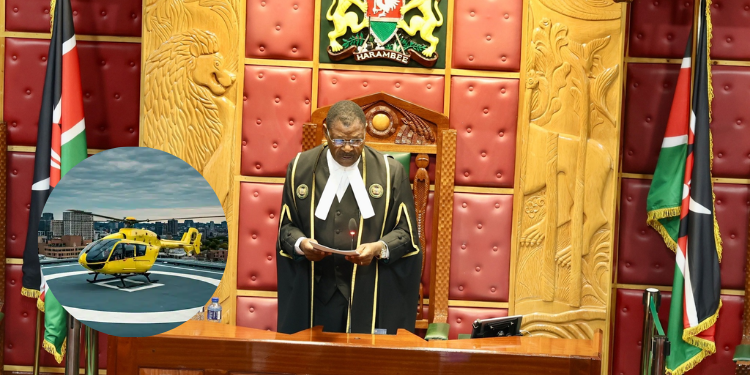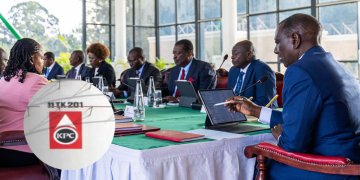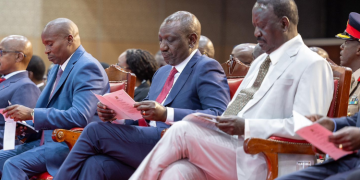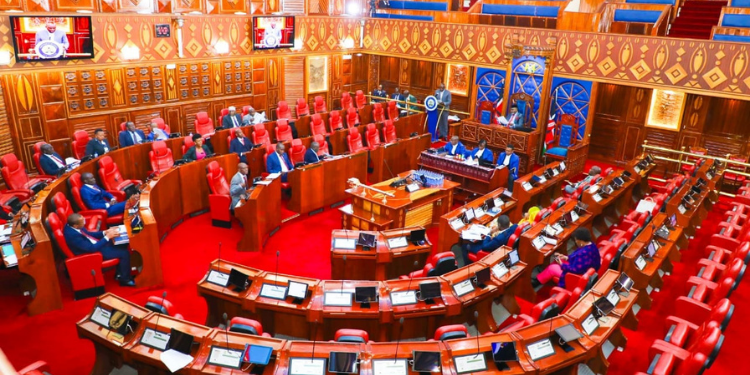The Senate has dismissed claims circulating on social media platforms suggesting that the Constitution of Kenya (Amendment) Bill, 2025, seeks to extend term limits and create the office of a Prime Minister.
In a statement issued on September 9, the Senate reaffirmed the facts based on the actual contents of the Bill, stressing that it neither alters the term limits of elected leaders nor restructures the national executive.
“This information is incorrect (in reference to the circulating Constitution of Kenya (Amendment) Bill, 2025). A review of the official Constitution of Kenya (Amendment) Bill, 2025, shows that the claims being made are false,” read part of the statement.
According to the clarification:
- The Bill Does Not Extend Term Limits
According to the Senate, nowhere in the Constitution of Kenya (Amendment) Bill, 2025, is there any proposal to extend the terms of office for the President, Governors, Members of Parliament, or Members of County Assemblies from five to seven years. The Bill does not amend the articles of the Constitution that deal with term limits for these elective positions. - The Bill Does Not Create a Prime Minister Post
Additionally, the Bill makes no mention of creating the Office of the Prime Minister or any other new position within the executive branch. The proposed amendments do not alter the existing structure of the national executive.
What changes does the Senate Bill propose?
The Constitution of Kenya (Amendment) Bill, 2025, published in the Kenya Gazette Supplement on July 22, 2025, proposes sweeping changes that involve devolution, the legislative process, and clarifying the roles of Parliament.
Parliament’s Proposed Roles
The Constitution of Kenya (Amendment) Bill, 2025, proposes to expand Parliament’s role. Parliament will not only make laws and represent citizens but also oversee the Executive and other state organs.
Additionally, both the National Assembly and the Senate will share legislative authority at the national level.
Parliament will also oversee the allocation and expenditure of national revenue, as well as monitor the operations of state organs and other public entities.
When exercising these powers, it must ensure that all laws respect the roles of both national and county governments, while upholding national values and principles of governance.
Additionally, Parliament will be required to pass a law outlining the procedure for removing state officers at the national level.
These changes will be made to Articles 94 and 96 of the Constitution of Kenya.
Also Read: Why Raila Wants Changes to Grant Senate More Powers in Kenya
The Role of the Senate
The Bill also introduces a new mandate for the Senate to represent special interests in the House, deliberate on issues of concern to counties, and enact laws in line with the Constitution.
The Senate’s financial role is expanded to cover not only revenue allocated to counties but also revenue raised by counties.
These changes will be made to Article 96 of the Constitution of Kenya.
Parliamentary Leadership and Law-Making Process
The proposed amendments also adjust the parliamentary leadership and the process of passing laws.
Both Houses will now have the power to introduce Bills, except for revenue-raising Bills, which remain exclusive to the National Assembly. Importantly, all Bills must be passed by both Houses before being sent to the President.
For this, Articles 110 and 114 have been proposed to be deleted. These were the provisions that previously caused disagreements between the National Assembly and the Senate on whether certain laws concerned counties or involved public money.
Also Read: National Assembly Rejects Ndengu Bill 2022 Passed by Senate
Expanded Oversight Powers
The Bill also expands Parliament’s authority in vetting and approving key public officials. Positions such as the Director of Public Prosecutions, the Controller of Budget, the Auditor-General, and members of the Public Service Commission and other commissions will now require approval from the whole Parliament—not just the National Assembly.
Budget estimates, supplementary budgets, and appropriations will also be considered and approved by both Houses, making the budget process more inclusive.
Proposed Changes in Counties
To support counties, the Bill introduces a new Article 199A establishing a County Assembly Fund. This Fund will finance the operations of county assemblies, with money drawn directly from the County Revenue Fund.
Amendments to Article 224 also shall allow county governments to access funds from the Consolidated Fund in the event of delays in passing revenue-sharing Bills, ensuring that counties continue to function without interruption.
Follow our WhatsApp Channel and X Account for real-time news updates.













































































